Role of International Players
Congo’s burden is its wealth; its wealth is its burden. I live on the Rwandan/Congolese border, on the shores of the limnic Lake Kivu, in Goma, a town that grew on the substrate of the Rwandan genocide as passageway for tens of thousands of refugees. Settled at the base of a still-active volcano, Goma is now a dusty base for NGOs, UN deployments, miners and business people profiting from cross-border trade, as well as an ongoing mixture of floating expatriates who fit no clear category.
In its purgatorial state – not at war, yet hardly at peace – the non-profit world still leans towards a humanitarian inclination; few others are willing to, or have the capacity to deal with the still frequent reality of armed robberies and violent attacks on their houses, vehicles and projects. There is a sprinkling of smaller development NGOs as well who have tried to break into a range of longer-term goals. But donors are trigger shy. Who wants to invest in a place where any day the city might be threatened by rebel groups, the smoldering volcano might rumble over again as it did in 2002, or the methane-floored lake might erupt, with earthquakes and mythical tsunamis?
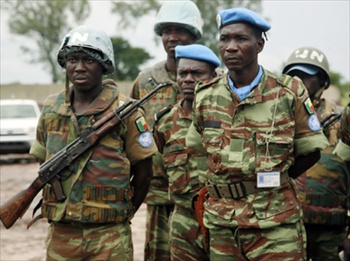
- MONUSCO DRC Peace Keppers (Source: www.unmultimedia.org)
Surrounding the aid community are the various branches of the UN, with MONUSCO (the so-called peace-keeping mission in DRC) lumbering or hovering by at all times in Goma, and throughout the region. They have a staff photographer who takes beautiful photographs, run a radio station known for decent journalistic standards and otherwise maintain a mission whose silence speaks loudly to those in search of transparency. They are a “peace- keeping”missionbutwhatpeace,infact, are they keeping? And whose peace? They are questions for which I do not, but I imagine that someone does, have the answer.
What is interesting about being in DRC at this time in history is that civil groups (students, representative of grassroots NGOs, women’s groups) have also begun to ask why, when the aid community has now been here for decades, and the UN semi-occupies their towns, the situation is still so bad for the population.
This questioning may take the form of threats to NGOs for what are seen as biased recruitment practices, or demonstrations against the aid community in general. I work for an NGO, so this kind of response is perhaps professionally concerning but I find it personally fascinating, and cannot quite avoid a sense of pride when I see it. In the last 25-30 years, where have been the voices of these “beneficiaries” (or, as a friend of a friend once called them, these “right-holders”) in the system of international aid? To whom is the aid community accountable? If we have been acting in the place of the government then why should the population not begin to ask us to be more accountable as a government? If we did not want the role, then why did we take it? And can we reject it now, while still wanting to maintain our invested presence?
What is primarily fascinating to me is that in this region of Congo the government has been for so long so ineffective and seemingly uninterested in providing its most basic match to the social contract that the international community has felt obligated to invest in the long-term. It has saved lives, certainly; for all extents and purposes the people of Congo seem to be an expendable resource for their government.
In fact, the longer you stay in the country the more unbelievable it becomes that people here are living in abject poverty.
This is not a poor country; it is a country where a very few people in power refuse to direct the wealth of the country to those who by their birthright own it.
In Eastern DRC the aid community has been present for decades, during which time the government has been largely absent (in terms of providing anything for the people) and international actors have been invited in for their own benefit. The aid community’s investment in this area of the world has begun to strike those who live here as shallow. Those of us in the aid community like to distinguish between ourselves and the UN forces. But for the population I do not believe there is any such clear distinction.Inspiteofwhateverefforts, most people are still living without employment, without access to basic healthcare, without access to education and with an unreasonably high level of insecurity that often enough turns to terror and fleeing.
Today, as I write this, we received news of a new group of 20,000 people displaced in the south because of attacks on their towns and villages, and another 3-5,000 displaced across the border in the north, as well as various villages pillaged and emptied in the center of the country. These numbers are difficult to care about. Perhaps that sounds cold but is it not true for most of us, much of the time? Life is complicated and busy; what does it mean that 20,000 people were displaced? They were not killed, or drowned, or burned, or dying from car crashes. They just had to move.
In our garden on the edge of Lake Kivu, the morning sun distributes itself as if committed to a black and white spectrum: the qualities of brightness and saturation (flower stalks between the lava rock walls, grass blades rolling into the ripples on the shimmering and oceanic surface of the lake) somehow carry more meaning than the color. The color is so saturated (fuscia, orange, white-green new leaves) that it almost outdoes itself, and leaves room in the mind only for form.
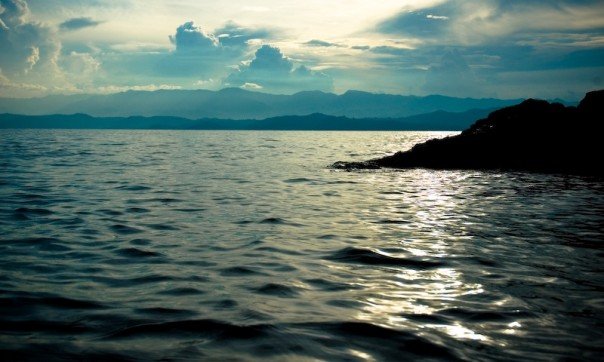
- Lake Kivu
Congo is a riot of color, and the color so cinematic, and so real, that there is rarely a struggle to define its quality, or to pin down a moment in its transience, and so somewhere in the experience of these extremes the mind becomes oddly free to see what is otherwise so often disguised by beauty. Form. Depth. Movement.
Today we will leave the city of Goma to go 3-4 hours north to one of our projects, driving straight towards towering Nyirongongo. Yesterday I watched the steam trail of this hulking volcano pouring to the west, only 10km from the city and for once free from haze or clouds. As we drive north we will see other volcanoes – baby ones, grandfather ones – one long chain of seismic gasps in the earth’s surface.
We are Like Pompeii; Our Human History Ripe for Repetition.
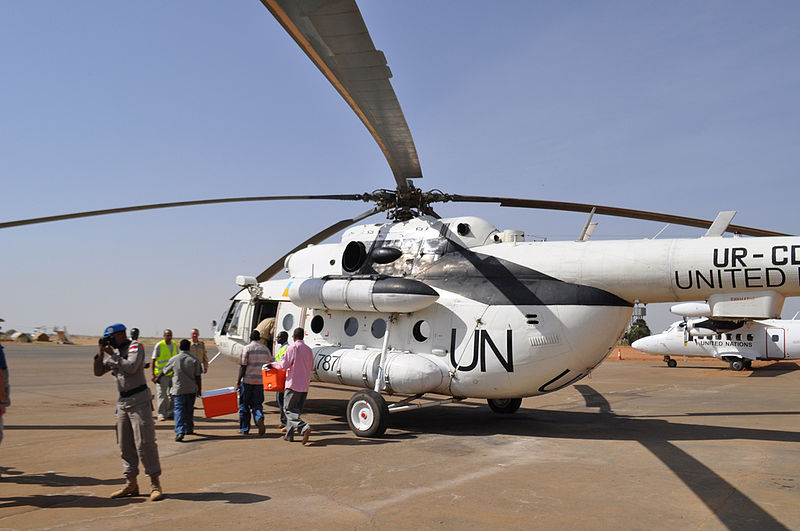 The helicopters have begun again. It is a measure throughout the world, or at least throughout the UN-occupied world, that the number of helicopters you hear corresponds directly to the state of security of the country. Here, the helicopters and the planes and the armored vehicles and the egg-carton UN trucks with their legions of homesick soldiers are omnipresent and have begun to multiply like bacteria in a petri dish: exponential, overnight. We wish they wouldn’t. We know that peacekeeping is only useful when there is war-making. We know that carrying guns makes things worse, even when you hope to make things better.
The helicopters have begun again. It is a measure throughout the world, or at least throughout the UN-occupied world, that the number of helicopters you hear corresponds directly to the state of security of the country. Here, the helicopters and the planes and the armored vehicles and the egg-carton UN trucks with their legions of homesick soldiers are omnipresent and have begun to multiply like bacteria in a petri dish: exponential, overnight. We wish they wouldn’t. We know that peacekeeping is only useful when there is war-making. We know that carrying guns makes things worse, even when you hope to make things better.
I spent more than two years living in Rwanda. And although Rwanda is a world and culture of its own, returning to Congo last September still felt like coming home; the film-set quality of central African light, the forehead knob greetings, the petites aubergines: these were things I knew, and had already grown to love.
But Congo, or at least the region of the Kivus, where I now live, is already loved by too many. Last night I heard someone try to explain the “way it all works” to a new expat. He tossed his hands around, trying to illustrate the mess of armed groups and economic power players – mining and technological and pharmaceutical companies – the way they are all subsidiaries of the other, who is loyalist to, and who is enemy of whom, what Rwanda wants, what the government wants, what China and Europe want, and also how to recognize the heart of a soldier by the shape of his nose. It is the pride of the foreigner here to be able to recite these things; but their reports are given with such gusto that it makes me wonder how genuinely we would want to remove the cause of such excellent entertainment.
What is it, this quality of stability, that allows us to live our lives? We speak about instability as the root cause of so much suffering in eastern Congo, assuming or stating, that what we would wish for the country is for it to be stable and the people to have this thing, stability, otherwise defined as: constancy, steadiness, firmness, fixity, permanence.
But stability is not a goal in and of itself; it is a consequence.
Yesterday we drove through a town that seemed like a town. It was not deserted or pillaged; it was full of normal life. Market women called out greetings to passers-by, or sat with sleepy eyes next to piles of avocados. Men repaired motorcycles next to shops. Children gossiped in school uniforms. Life seemed calm and, yes, stable.
Just north of this town in the past month several thousands of people have run from their homes across the border to Uganda, seeking refuge. Life in war is like this; alternately calm and terrifying and, often, simply surreal.
Driving through North Kivu yesterday it occurred to me to remind myself that I am living in a country at war. We prefer now – and it is probably officially classified this way – to say that the Kivus are in a state of ongoing instability and conflict. Ok, fine. Then what, I wonder, is war?
Something well-defined? One group versus another? The groups internationally powerful and the cause considered admirable?
Or is “war” simply a definition that is useful for clarifying when and how and where another government is obligated to break the autonomy of a nation-state and intervene, on an international level?
But what autonomy, I ask? Our worlds and our economies are interlinked. Our minerals and our natural resources cross all borders. Our human suffering does as well. We are often trained, in the West, to view poverty and the suffering of people living in conditions of conflict as very sad and inevitable things. I certainly grew up thinking this: how sad that there are poor people who cannot eat and are caught in war; we must take them food, we must bring them to a place of peace.
I did not grow up thinking, “it is my responsibility to research the pharmaceutical and technological countries that make the items I want to buy because it is the market demand for their products that is continuing this conflict a million human-paradigm years away.”
I did not grow up thinking, “nobody in Congo should actually be living in poverty and the fact that they are is not a fatalistic sad fact of life. No. The fact that they are is a direct result of our (and I speak of the world) choices.”
It is not an oversight of Mother Nature that people in Congo are living in poverty and dying of preventable diseases and violence; it is our ongoing investment in political and economic systems whose implementation, if not intent, is criminal: criminal because we are making specific choices that allow these systems to continue, and we are passing off the costs to those who cannot object.
This is an abuse of power, and no matter how diffused we render the responsibility, no matter how well we hide the links between death on the ground and a product in the store, no matter how many millions of dollars we spend on conciliatory peacekeeping and micro-economic development efforts, we are still in the wrong. Quite simply. We are in the wrong.
Human history is always ripe for repetition, true, but we are the ones choosing what it is that we will repeat. (Photos used in the article: source UN, under creative commons license. Emily can be reached by email at emilycavan@gmail. com and follow her DRC experience on her blog www.emilycavan.blogspot.com)
This article originally appeared in the April 2012 issue of Global South Development Magazine along with a DRC Country profile and a Historical Timeline. You can download the issue in its entirety for free.



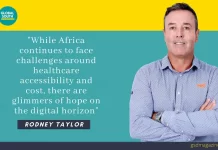
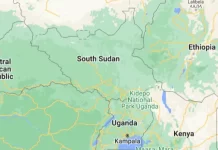




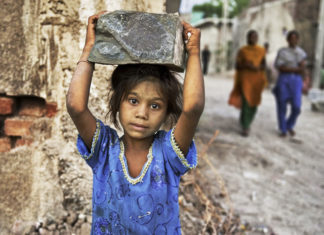
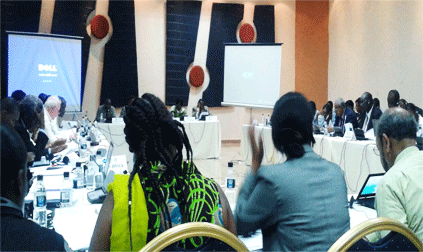
[…] DRC Diary: A Reflection From The Field. […]
[…] DRC Diary: A Reflection From The Field […]
[…] People Still a Target for Islamist Inquisitors in Bangladesh « Previous / Next » By thedevelopmentroast / June 14, 2012 / Asia, Bangladesh, Children, Girls, […]